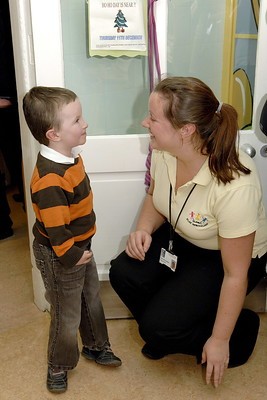Getting Preschoolers to Cooperate: A Tiny Change for Big Results
 Do you have trouble getting your preschooler to cooperate? (That was a joke…of course you do—they're preschoolers!)
Do you have trouble getting your preschooler to cooperate? (That was a joke…of course you do—they're preschoolers!)
One simple change you can make--without much effort, without discussing parenting philosophy with your spouse, without brainstorming rewards or meting out punishments— can make a significant change in how cooperative your preschooler becomes.
And don't tell, but it will probably work on the adults in your life, too.
Let me show you the idea, starting with a personal example.
I grocery shop once a week, and I go with a detailed list, which usually doesn't include ice cream. But every week, as I walk through the coffee and tea section, I know I am coming up on "the aisle of temptation."
At this point, I might say to myself, "Don't go down the ice cream aisle!" At which point, I involuntarily start picturing cold, sweet, chocolatey goodness melting around my tongue.
My other option is to say to myself, "Christen, head to the produce aisle and pick out mangoes and fresh greens for smoothies." Then I start smelling the exotic sweetness of the banana and mango I use for green smoothies, and I remember how good it feels barely noticing that I just drank two servings of leafy greens.
Which option is more likely to result in healthier choices for me? My willpower is the same (weak) in both scenarios, but the simple way I talk to myself triggers different motivations for me.
With preschoolers, we may run around all day saying things like, "Don't put playdough in the dvd player! Don't play with Grandma's china figurine! Don't wrestle next to the carefully stacked cans in the grocery store. Don't write on your brother! Or the walls. Or the carpet. Or your clothes…."
Some experts believe that preschoolers don't actually understand contractions (as in "don't"). But whether they do or not, telling them what to do is vastly more effective than telling them what not to do, purely because the action you highlight in your sentence triggers images and feelings in their brains that are likely to result in action.
I don't ignore my command to "not go down the ice cream aisle" because I'm rebellious. I do it because I set off pathways in my brain that focus on ice cream.
So if you catch your three-year-old reaching for Grandma's china, your best bet is to say, "Put your hands together!" (Also a good command when you are sending a sticky-handed child down the hall to wash her hands.) That instantly redirects your child's attention to a positive action while you reach for a colorful book or the Little People mail truck.
If you're looking for "a new preschooler by Tuesday" (or your money back!), give some thought today to how you might rephrase your common commands into the positive.
And don't say don't. (Wait…let me rephrase that….)
P.S. If you liked this post, subscribe to our blog at the top right corner, and follow us on facebook.
Photo Credit: CMRF_Crumlin cc
Related Posts
By accepting you will be accessing a service provided by a third-party external to https://growthandgiggles.com/